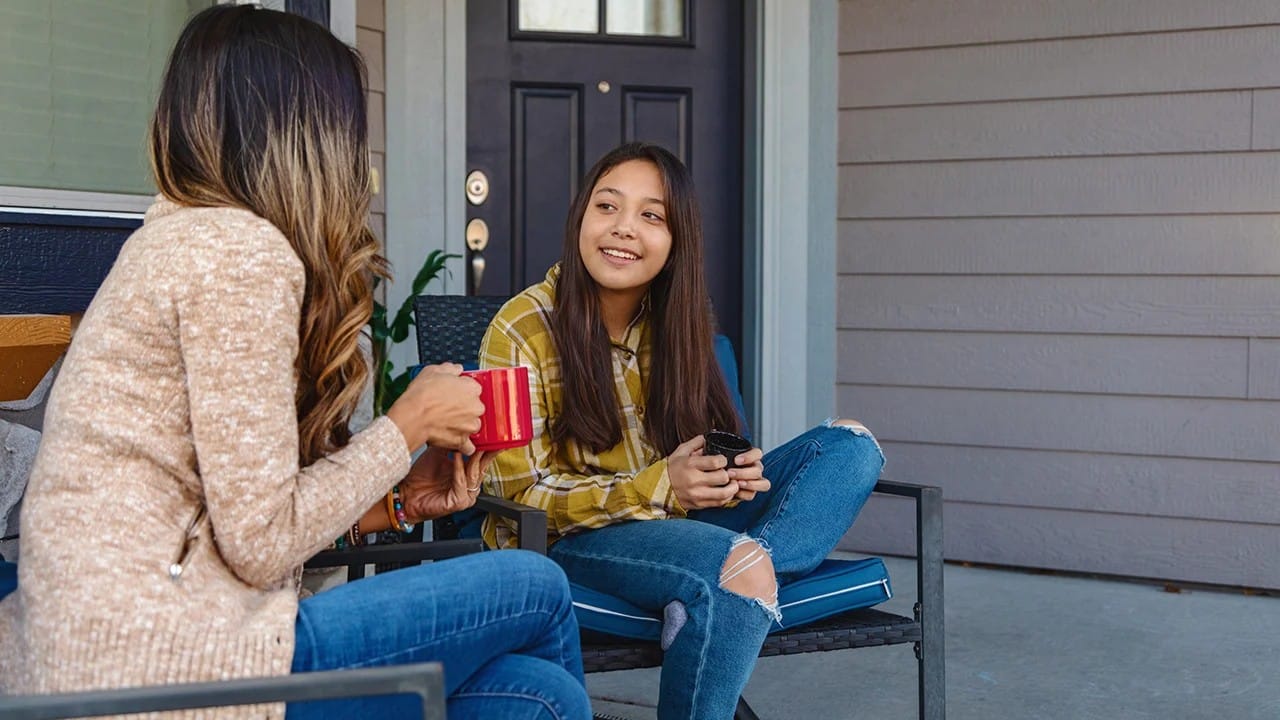Teen life comes with unique stressors, from academic pressure to social dynamics, and it’s not always easy for parents to know how to help. Add in challenges like emotional dysregulation, communication struggles, and isolation, and it’s clear today’s teens need more support than ever. In this blog, mental health expert Stephanie De Jesus Ayala, MS, of Children’s Hospital Colorado’s Partners for Children’s Mental Health, joins teens from their Youth Advisory Council to share the guidance they wish every parent had; including conversation starters, connection tips, and ways to build trust without overwhelming your teen.
In the years since the COVID-19 pandemic began, a lot has changed in the youth mental health landscape. And while many kids would say the difficulties that came with a lockdown and the eventual return to semi-normal life are in the past, Stephanie De Jesus Ayala, MS, Program Manager of Children’s Hospital Colorado’s Partners for Children’s Mental Health, says we are still seeing the leftover effects of social isolation.
“What we are noticing are reduced social skills,” she explains. “How do you talk to people? How do you manage your frustrations when something is not going the way you want? We see a lot of dysregulation and struggles with being able to engage in real-world conversations and real-world activities.”
As parents and caregivers do their best to help their children with this post-pandemic “hangover,” De Jesus Ayala has some advice. And she’s not the only one. Teens from our Youth Advisory Council provided some tips on how to best connect with them and check on their mental well-being, too.
How to help a teenager with mental health issues
Members of our council shared the things they want parents and caregivers to know about helping them through mental health struggles. Plus, De Jesus Ayala shares a few additional tips.
Having conversations about teen mental health
It can be hard to know how to spark conversation with your teenager or what questions will actually let you know how they are doing. Our youth council members told us what they want to hear from their parents. These are some questions they recommend asking:
- How are you feeling today, really — physically and mentally?
- ¿Qué es lo que más le ocupa ahora mismo?
- How have you been sleeping? How do you want to improve your sleep?
- What have you been doing for ejercicio?
- ¿Qué has hecho hoy que te haya hecho sentir bien?
- ¿Qué espera con impaciencia en los próximos días?
- ¿Qué puedes hacer hoy que te haga sentir bien?
- What are you grateful for right now?
Try not to snap at them
Our teen advisors noted that they often face social, school or other pressures that may be hard for them to talk about. Try to be extra patient and compassionate, rather than giving in to frustration and anger.
Expert tip: “Leading by example is a big one. So, if we're having a conversation that is getting heated and people are getting frustrated, parents could pause and say, ‘I'm feeling very frustrated, and I don't want to say or do something that would be hurtful. Maybe we should take little break, and then we'll come back to this conversation fresh.’ We would never snap at our coworkers in the same way. So we need to offer the same amount of grace to the kids that we love and cherish.”
Give them space
When you’re worried about your child’s emotional well-being, it can be hard not to hover. Instead, our youth council members said they want parents to check in with them at the end of the day and consider asking some of the questions we shared above.
Expert tip: “When you are going to have difficult conversations, I like them to be planned. I like both people to know that we're going to have this conversation so that they're prepared. I would even have a code word that means we're done, and I recommend something silly. It’s about allowing them to have space and privacy. I know that's really hard for parents, but our goal as parents is always to raise youth that can manage themselves, right? So, we want them to be able to have some privacy and independence, and the only way to do that is to test it out at home and give them that space to mess up a little bit.”
Crear tiempo para la familia
Teens need time for family as much as anyone else, according to our teen advisors. Set aside some time to do something fun and bond as a family. Movie nights, cooking, taking a walk, game nights and other communal activities are great options.
Expert tip: “Be intentional about developing your relationship with your kids. That's hard, because we're all limited on time, but the important piece is finding moments of connection. What we find is that youth are 2.6 times less likely to die by suicide or have significant mental health issues if they have at least one adult who is supportive and engaged in their life.”
Anime a su hijo en lugar de castigarlo
Simply telling your child what to do doesn’t always lead to the best outcomes. Instead, our teen advisors say it’s helpful to let them plan out things like school assignments, chores or other commitments and give them the leeway to figure out how to do it. This make it feel less like a demand and more like a partnership. This will also increase their sense of accomplishment once they finish.
Expert tip: “Focusing on ‘do’ rather than ‘do not’ just helps redirect the behavior. It's easier for youth to think about what they're allowed to do rather than stopping themselves from always doing what they shouldn't do, even if it takes more mental energy and bandwidth from the parents.”
Connecting with community
One of the best ways to help kids, especially in the aftermath of the pandemic, is to focus on building community to help avoid feelings of loneliness. This could be through spiritual beliefs, shared interests, support groups, neighborhoods and more. De Jesus Ayala says she encourages families and kids to build community not only to help with mental health in the moment, but also to be there for you and your family when times get tough.
“Society is set up in such an individualistic way when we know that community-oriented styles are typically healthier for people,” De Jesus Ayala says. “Being able to organize with your local community, go into your local library and join those support groups helps you build community, friendships and places that you can lean on for support.”
Signs your kid or teen may need help
If you notice your child showing any of the following signs, check in with them:
- Having tantrums, kicking and/or screaming
- Estar irritable y lloroso
- Búsqueda constante de seguridad
- Cambios en los hábitos de sueño o alimentación
- Isolating themselves
- Sentirse menos motivado o no ser capaz de hacer las cosas, como las tareas escolares o domésticas.
- Not enjoying activities that they usually do
Mental health resources for teens
Regardless of what your teen may be struggling with, there are resources both within healthcare and within your community that can help support you and them.

